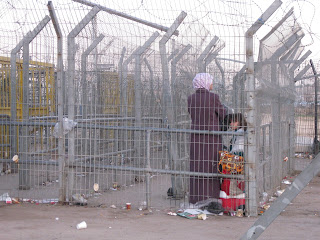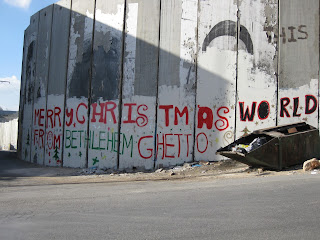One of the expectations in our placement in Tulkarm is for us to be present at the checkpoints. Perhaps I should explain what I mean by a checkpoint. Rather than me explain, here is an explanation written by a Palestinian:
A Checkpoint is a barrier built by the Israeli Defense Forces or Border Police to limit the movement of Palestinians who lack necessary permits. Normally, Israeli citizens, settlers and foreigners move through the checkpoints without being stopped. Palestinians with permits frequently experience extreme delays and humiliation at these barriers.
Here is a description of how it works, again written by a Palestinian woman:
"What is a checkpoint? Let me give you a brief description. Usually it's some cement blocks in the road that you have to stop at. Soldiers with big guns motion for you to come forward when they want; sometimes they'll keep cars for hours while they stand around and joke with each other. Usually there's maybe one soldier checking a long line of idling cars and one checking a long line of tired pedestrians, and about five sitting in the shade, doing no apparent 'work.' Some times they let you through with a cursory ID check, sometimes they make you unload all of your gear, they check under the vehicle, they question you about irrelevant facts, and they turn you back. At checkpoints near Jewish settlements, there is a separate way, without a stop, for settlers, who are distinguished by yellow Israeli license plates as opposed to green Palestinian ones. Allegedly set up for Israeli 'security,' their effect, as I'm sure I've said before, is to slowly strangle Palestinian life and freedom."
I must explain that the checkpoint at Taybe is only set up for Palestinians, since Tulkarm is totally a Palestinian town with no tourism. The checkpoint allows Palestinians to pass through the Separation Barrier in order to access Israel or land in the "seam" (between the barrier and Israel). The checkpoint is mainly used to access jobs on the other side of the barrier.
 |
| Tulkarm Checkpoint |
The alarm was set for 3:00 a.m. so that Vidar and I could get to the Taybe Checkpoint before 4 a.m. The taxi driver was sleeping in his office but he is used to our early morning requests and he readily loaded us in his taxi for the ride to the checkpoint. There is a variety of food available from vendors before the place where people start standing in line.
It was totally packed even before we arrived and continued that way until 7 a.m. This particular Checkpoint is open throughout the day but Palestinians who work in Israeli wait in line very early in the morning so they can get to their jobs on time. This checkpoint is managed by a private company so no one is visible as people go through the various gates. There was a sound like a siren going all the time. People crammed in by the hundreds waiting for a green light to let as many people as possible through the first gate. Then the gate slams shut as the light goes from green back to red.
 |
| A man named Omar |
 |
| Waiting For Hours to Get to Work |
There is a shift in the waiting group as everyone moves forward a bit. The first group who made it through that far must then show identification, have their fingerprints verified and show everything they are bringing with them for the day. That sometimes means dumping their belongings on the ground if that’s what they are ordered to do.
We stood by the gate to count the number of people going through and assist if there were problems getting through. We have back-up phone numbers we can call such as the Humanitarian Hotline or Machcom Watch. Machcom is a group of Israeli women who are dedicated to showing up at checkpoints and advocating on behalf of the Palestinians.
We watched a couple thousand go through this process today. Even though it is a bit of a chore for us to get up early to be there, the inconvenience is not nearly so great for us as it is for each of these Palestinians who face dehumanizing treatment every day just to get to work. They are crowded like cattle going into a sales ring. There is little human interaction with the Israelis except for anonymous voices on a loudspeaker requesting to see ids or the contents of bags or pockets. Anyone going through the checkpoint must return the same day or they will lose their "permits."
We watched a couple thousand go through this process today. Even though it is a bit of a chore for us to get up early to be there, the inconvenience is not nearly so great for us as it is for each of these Palestinians who face dehumanizing treatment every day just to get to work. They are crowded like cattle going into a sales ring. There is little human interaction with the Israelis except for anonymous voices on a loudspeaker requesting to see ids or the contents of bags or pockets. Anyone going through the checkpoint must return the same day or they will lose their "permits."
We saw women standing off to the side. They had to go through the same gate as the men even though it is culturally unacceptable for a woman to be in close proximity to a man.As it was getting lighter I noticed a woman and her two daughters patiently waiting. I went over to talk to them and also asked if it was o.k. to take their picture. The woman said they would be visiting her husband today.
She went on to say that her husband has been in prison for 6 years. Her daughters age 6 & 7 have not been able to get to know their father. There are many men in Palestine who have been imprisoned for years, some having been there for throwing rocks as teens. The International Red Cross is committed to helping families visit their loved ones who are in prison.
The people of Tulkarm have all treated us with dignity and respect. We seldom can pass a shop or a group without having them greet us warmly or smile. I marvel at how they can maintain such dignity in the face of daily humiliation, degradation and dehumanization.
The people of Tulkarm have all treated us with dignity and respect. We seldom can pass a shop or a group without having them greet us warmly or smile. I marvel at how they can maintain such dignity in the face of daily humiliation, degradation and dehumanization.







This is incredible. I hope people see this far and wide. This looks like extreme apartheid to me.
ReplyDeleteSusanne, how did you take those pictures if it is written "photography prohibited"?
ReplyDelete